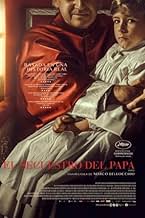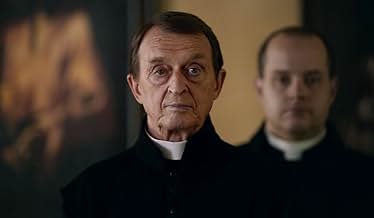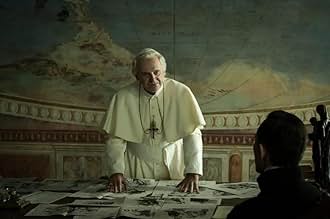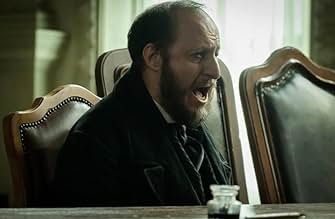IMDb RATING
7.0/10
4.3K
YOUR RATING
A Jewish boy is kidnapped and converted to Catholicism in 1858.A Jewish boy is kidnapped and converted to Catholicism in 1858.A Jewish boy is kidnapped and converted to Catholicism in 1858.
- Awards
- 20 wins & 16 nominations total
Daniele Aldrovandi
- Bonaiuto Sanguinetti
- (as Pietro Daniele Aldrovandi)
Featured reviews
Or is it strangers than fiction? Well whatever the case (and no pun intended as always of course), the apparently true story of a young boy who is being taken away from his family ... to become something quite ... well different from what he'd otherwise be. And the struggle of the family to become whole again as one might suspect.
Am a bit surprised to see all the awards and nominations - had not heard about this before. But that should not sway you away or take anything from the movie. Sometimes there's movies you just discover like this (and the same probably is true for you) ... by the way kidnapping (in this case literally, so definitely no pun intended) is nothing I would call a discovery ... but what happens after that ... well there is quite the mayhem that ensues ... so don't expect this to pull punches or be soft (action part of it but also the general story) ... there is a text introduction and an ... outro-duction? Not sure what it is called, but you get the meaning surely.
Am a bit surprised to see all the awards and nominations - had not heard about this before. But that should not sway you away or take anything from the movie. Sometimes there's movies you just discover like this (and the same probably is true for you) ... by the way kidnapping (in this case literally, so definitely no pun intended) is nothing I would call a discovery ... but what happens after that ... well there is quite the mayhem that ensues ... so don't expect this to pull punches or be soft (action part of it but also the general story) ... there is a text introduction and an ... outro-duction? Not sure what it is called, but you get the meaning surely.
Based on a bizarre true story, this follows the tale of the young Edgardo Sala who was living quite happily with his Jewish parents and siblings in Bologna until an official arrives one evening to tell them he is to be removed from their care. Why? It appears that many years earlier when he was in his cradle, he has been baptised and so must therefore be looked after by the church. Despite their appeals and protestations, he is swiftly taken to Rome where he is enrolled in a Catholic school where his is pretty thoroughly indoctrinated into the ways of his new Church - even becoming of special interest to Pope Pius IX (Paolo Pierobon). The story really centres around the trial many year later of the Papal Officer Feletti (Fabrizio Gifuni) after the city had become part of the Italian Kingdom, and those proceedings are used to fill in some of the backstory and to test the theories of responsibility of actions done in the name of the State. Perhaps unsurprisingly, the young man grows up to become conflicted - his love of Jesus struggles with his love of family and of the Talmud that was so important to him as a child. What I didn't really understand was just why the Pope would ever been at all interested in the fate of a small Jewish lad when the Papal States were in permanent decline, but Marco Bellochio uses a solid cast and a sparing, but frequently impassioned, amount of dialogue to deliver a stylishly made intrigue that show the last vestiges of the once all-powerful Papacy and of the inconsequential hopes of a family and a small boy.
Now here's a story that's set some time in the past, although it's not that long ago and it might leave you quite aghast, as a child is abducted by a dogma in sheep's clothing, it will leave you disenfranchised with feelings of hate and loathing; now the outcome isn't pretty but you may learn something new, about conditioning by others that impacted how you grew, the brainwashing and persuasion - indoctrination, education, that was planted in your mind before you fledged, matured and grew; but there's one thing that won't come as a surprise or revelation, that there's masons, cults and cliques that will lead you to damnation, they control the lives of others, keep their secrets under covers, once their hooks have found their mark, you'll get accustomed to prostration.
Seen at NYFF61.
As with "The Traitor", another broad-brush panorama of a changing world, Marco Bellocchio's political sympathies are not hidden, but the dilemmas and perplexities facing his characters can often be oversimplified. Here in "Kidnapped", he recounts a shameful episode in the waning days of Papal secular power prior to the unification of the Italian state, in which a 6-year-old Jewish boy is ordered by the authorities (they of the "Holy Office" of Inquisition infamy) to be yanked from the arms of his parents because of an alleged furtive and illicit baptism performed when his was an infant, making him a Christian who, for the protection of his immortal soul, could no longer be raised in a Jewish family. He is taken to Rome, to be raised in an institution for converted boys destined for the priesthood, while his case becomes an international scandal, seized upon by anti-clerical circles throughout Europe and beyond, to the immense irritation of the Pope and the Curia.
The notion of dogma is central to Bellocchio's account (he co-wrote the screenplay), with those of both the Church and of the Jewish community leaving the boy, Edgardo, yanked between the two, emotionally crippled. (To be sure we get the point, Edgardo innocently recites a rote definition of the word during a visit by the Pope.) And the annexation of the Papal States by the anti-clerical Kingdom of Italy, which should have brushed aside religious impediments to the by-then young adult Edgardo's resumption of a relationship with his family, also fails the cause of secularization and human agency through the intercession of the dead hand of yet another dogma, this one of the secular-legal kind. Any chances of putting aside impediments to loving human relationships are thus dashed.
The narration is uneven and at times a bit paint-by-numbers, but the screenplay, while over-the-top is some places, elsewhere shows self-restraint, for example in not seeking to caricature Edgardo's treatment at the hands of the Church as brutal (beyond, of course, the brutality of the kidnapping itself and of the ongoing separation from his family). While clearly putting institutional self-interest first, the priests and nuns are shown as acting with kindness and even a form of love for the boys in their care. Despite moments of rebellion, Edgardo is shown as being irrevocably absorbed into their world, even as change swirls all around them. The psychological evolution here might have been treated with greater precision and subtlety, but Bellocchio in the end makes his point, which I take to be that there is no going back on the forces that shape us, however perverse.
Visually, the film is a treat. Bellocchio, the well-named "beautiful eye", treats us to color-saturated, painterly sequences - some of the interior shots seem downright, if self-consciously, Vermeerish. And Bellocchio has always a gift for casting - "Kidnapped" may in the end be worth watching just for the tremendous performance of Paolo Pierobon as Pius IX, the last Pope to reign over the Papal States, whose bone-headed, unflinching self-certitude (it was he who formalized the doctrine of papal infallibility even as his political actions demonstrated its opposite) served as an accelerant of his ultimate downfall. (Pierobon's physical resemblance, in different ways, to both the late John-Paul II and Benedict XVI is surely not accidental.) So many other, smaller roles, are ideally taken and vividly portrayed. Like "The Traitor", this is very much an ensemble performance, and all the finer for it.
"Kidnapped" is an honorable effort to grapple with a complex subject, and even if it settles in the end for some facile exposition, it is well worth seeing. At a time when so many films are so narrowly focused, often hermetically so, on issues of self-realization and personal relationships, it's nice to see a project with some ambition and scope, even one that, as here, doesn't completely meet its promise.
As with "The Traitor", another broad-brush panorama of a changing world, Marco Bellocchio's political sympathies are not hidden, but the dilemmas and perplexities facing his characters can often be oversimplified. Here in "Kidnapped", he recounts a shameful episode in the waning days of Papal secular power prior to the unification of the Italian state, in which a 6-year-old Jewish boy is ordered by the authorities (they of the "Holy Office" of Inquisition infamy) to be yanked from the arms of his parents because of an alleged furtive and illicit baptism performed when his was an infant, making him a Christian who, for the protection of his immortal soul, could no longer be raised in a Jewish family. He is taken to Rome, to be raised in an institution for converted boys destined for the priesthood, while his case becomes an international scandal, seized upon by anti-clerical circles throughout Europe and beyond, to the immense irritation of the Pope and the Curia.
The notion of dogma is central to Bellocchio's account (he co-wrote the screenplay), with those of both the Church and of the Jewish community leaving the boy, Edgardo, yanked between the two, emotionally crippled. (To be sure we get the point, Edgardo innocently recites a rote definition of the word during a visit by the Pope.) And the annexation of the Papal States by the anti-clerical Kingdom of Italy, which should have brushed aside religious impediments to the by-then young adult Edgardo's resumption of a relationship with his family, also fails the cause of secularization and human agency through the intercession of the dead hand of yet another dogma, this one of the secular-legal kind. Any chances of putting aside impediments to loving human relationships are thus dashed.
The narration is uneven and at times a bit paint-by-numbers, but the screenplay, while over-the-top is some places, elsewhere shows self-restraint, for example in not seeking to caricature Edgardo's treatment at the hands of the Church as brutal (beyond, of course, the brutality of the kidnapping itself and of the ongoing separation from his family). While clearly putting institutional self-interest first, the priests and nuns are shown as acting with kindness and even a form of love for the boys in their care. Despite moments of rebellion, Edgardo is shown as being irrevocably absorbed into their world, even as change swirls all around them. The psychological evolution here might have been treated with greater precision and subtlety, but Bellocchio in the end makes his point, which I take to be that there is no going back on the forces that shape us, however perverse.
Visually, the film is a treat. Bellocchio, the well-named "beautiful eye", treats us to color-saturated, painterly sequences - some of the interior shots seem downright, if self-consciously, Vermeerish. And Bellocchio has always a gift for casting - "Kidnapped" may in the end be worth watching just for the tremendous performance of Paolo Pierobon as Pius IX, the last Pope to reign over the Papal States, whose bone-headed, unflinching self-certitude (it was he who formalized the doctrine of papal infallibility even as his political actions demonstrated its opposite) served as an accelerant of his ultimate downfall. (Pierobon's physical resemblance, in different ways, to both the late John-Paul II and Benedict XVI is surely not accidental.) So many other, smaller roles, are ideally taken and vividly portrayed. Like "The Traitor", this is very much an ensemble performance, and all the finer for it.
"Kidnapped" is an honorable effort to grapple with a complex subject, and even if it settles in the end for some facile exposition, it is well worth seeing. At a time when so many films are so narrowly focused, often hermetically so, on issues of self-realization and personal relationships, it's nice to see a project with some ambition and scope, even one that, as here, doesn't completely meet its promise.
As a film movie lover, depending on what city I am living in, I broaden my horizons by going to watch films at any festival. Since moving to Vancouver to pursue an education in film production at UBC, I have been excited to visit VIFF and watch a film. After scrolling through the website, I decided to see 'Kidnapped,' an Italian film by Marco Bellocchio. I haven't seen his films before, but I was excited to see this one. The film includes an intense historical drama of a Jewish toddler kidnapped by Pope Pius IX in 1865 because it was believed he had received a secret baptism. It was one of the best films I have seen and deserves more recognition. This rich, operatic film resonates strongly with the audience through the director's storytelling and the emotions portrayed by the actors in the movie.
Did you know
- TriviaSteven Spielberg was intending to direct a version of this story around 2016. He even was looking at casting the young boy's role though open auditions from Jewish Schools in Europe and America. Although he had cast Mark Rylance as Pope Pius IX and Oscar Isaac as the older Edgardo Mortara, Spielberg's inability to find the right child actor led to the project becoming stalled.
- Quotes
Salomone Mortara: What were we supposed to do?
- How long is Kidnapped: The Abduction of Edgardo Mortara?Powered by Alexa
Details
- Release date
- Countries of origin
- Official site
- Languages
- Also known as
- Kidnapped
- Filming locations
- Piazza Maggiore, Bologna, Emilia-Romagna, Italy(views of the cathedral facade)
- Production companies
- See more company credits at IMDbPro
Box office
- Budget
- €13,000,000 (estimated)
- Gross US & Canada
- $36,459
- Opening weekend US & Canada
- $12,925
- May 26, 2024
- Gross worldwide
- $4,138,472
- Runtime
- 2h 14m(134 min)
- Color
- Sound mix
- Aspect ratio
- 1.85 : 1
Contribute to this page
Suggest an edit or add missing content

![Watch Trailer [OV]](https://m.media-amazon.com/images/M/MV5BYjNlMjNkNDEtNDhhYS00MTNhLTg0MTUtZDQxNmU0MTBhMDc4XkEyXkFqcGdeQXRyYW5zY29kZS13b3JrZmxvdw@@._V1_QL75_UX500_CR0)





























